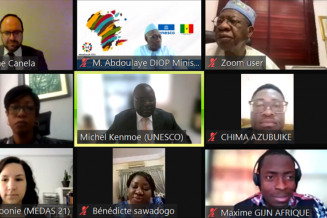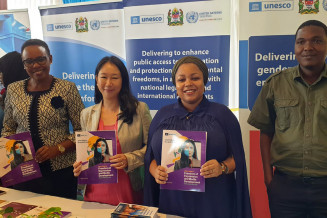The first week of May marked the celebration of World Press Freedom Day. As thousands of participants gathered both on-site in Punta del Este, Uruguay and online for the World Press Freedom Day Global Conference, many more mobilized around the world to tackle new and evolving threats to press freedom under the theme “Journalism under Digital Siege”.
The discussions during the conference made it obvious that this year’s World Press Freedom Day came at a critical time. UNESCO has previously sounded such alarms in its flagship report series World Trends in Freedom of Expression and Media Development, for which the 2021/2022 Global Report launched globally in March 2022.
The report finds that 85% of the world population experienced a decline in press freedom in their country over the past five years. Additionally, journalists are under enormous pressures not least from acute threats to their safety, including digital threats. At the same time, a shift of advertising revenue from news media to social media and search companies has eroded the business model of the media industry.
These findings have already been shared globally. From a special briefing in The Economist to Euractiv, from Rappler to Al Jazeera and from civil society organizations to the White House, advocates for freedom of expression have leveraged the report’s call to action to protect journalism as a public good.
Other key highlights from the Report include:
- Journalists are under attack: From 2016 to the end of 2021, UNESCO recorded the killings of 455 journalists, who either died for their work or while on the job. At the same time, imprisonment of journalists has reached record highs.
- New legal measures undermine, instead of bolster, press freedom: Since 2016, 44 countries have adopted or amended laws and regulations which threaten freedom of expression and press freedom online.
- Business model at breaking point: Growing numbers of media outlets have been forced to cut down on staff or close their doors permanently. Just two companies, Google and Meta, now receive approximately half of all global digital advertising spending.
To highlight these findings and engage with local stakeholders working on freedom of expression issues, UNESCO field offices organized over 50 regional and national events for World Press Freedom Day. Many of these included official regional launches of the 2021/2022 Global Report or were informed by the Report’s key findings, putting global trends in a local context. Some of these events include:
Latin American launch in Punta del Este
Highlighting synergies between the safety of journalists and the safety of artists

Under the umbrella of the full World Press Freedom Day Global Confernce, the regional launch event for Latin America and the Caribbean in Punta del Este, Uruguay, highlighted not just one, but two of UNESCO’s flagship reports.
During a dinner event sponsored by Al Jazeera, UNESCO presented the World Trends in Freedom of Expression and Media Development as well as Re|Shaping Policies for Creativity – Addressing culture as a global public good, produced by UNESCO’s Culture Sector.
The dinner highlighted synergies and potential avenues for collaboration in freedom of expression both in the media sector and in cultural fields.
The joint launch contributed to a broader agenda developed during the Conference, conceptualizing freedom of expression in a holistic way, particularly in the Latin American context. Speakers emphasized that lessons learned from UNESCO’s work on safety of journalists, including the World Trends Report, need to be applied and expanded to protect the freedom of expression of other profession, including cultural professionals.
The 2021/2022 Global Report was presented by lead editor Nick Benequista, Senior Director at the Center for International Media Assistance (CIMA). UNESCO Assistant Director-General for Communication and Information, Tawfik Jelassi, provided opening remarks:
World Trends Report Forum in West Africa

In partnership with West Africa Democracy Radio (WADR) et l'Institut Panos (IPAO), UNESCO’s Regional Office for West Africa in Dakar organized on 5 May a regional forum specifically dedicated to launching the 2021/2022 Global Report in the West African region.
Three Ministers of communication representing Senegal, Nigeria and Mali (respectively) were in attendance, as were representatives from a wide variety of stakeholders.
"Freedom of expression is a human right enshrined in our statutes and laws and an element of democracy everywhere," said Nigeria's Minister of Information and Culture, Mr. Lai Raufu Mohammed in his opening remarks. He also Nigeria will implement the recommendations of the Report to continue to make “freedom of expression one of the fundamental principles of our democracy, just as much as the safety of journalists and the media development.”
Following a presentation of the 2021/2022 Global Report, the findings of the Report were applied and compared to different country contexts by experts from the judiciary, civil society, and media organizations. In particular, the urgency of addressing the media viability challenge was stressed.
High level Pan-African event in Arusha

The regional launch of the World Trends Report in Africa coincided with the Africa-wide celebration for World Press Freedom Day on 1-3 May in Arusha, Tanzania. The event brought together over 650 people from all over Africa, including H.E. Mrs. Samia Suluhu Hassan, President of the United Republic of Tanzania.
As the report is directly informed by the Windhoek+30 Declaration, adopted in 2021 in Windhoek, Namibia, the event emphasized the African roots not only of the Declaration but of World Press Freedom Day as a whole. The commemoration produced several concrete outputs for safeguarding independent journalism in the region.
The UNESCO Regional Director for Eastern Africa, Hubert Gijzen, referenced the World Trends Report both in his opening speeches as well as during a signing ceremony for a Memorandum of Understanding with the Institute of Judicial Administration.
Guilherme Canela, Chief of the Section for Freedom of Expression and Media Development, also presented the key points of the 2021/2022 Global Report, setting the tone for the African World Press Freedom Day Meeting on 2 May. Over 500 copies of the Global Report were distributed, including to government Ministers and representatives to the African Union Commission.
The African Media Convention 2022 concluded with the adoption of the Arusha Declaration, which highlights a number of recommendations to support economic viability of independent news media and to reform laws and policies that criminalize free speech, facilitate surveillance, and impact privacy and the exercise of journalism.
The UNESCO Regional Office for Southern Africa also hosted a regional World Press Freedom Day commemoration in Bulawoyo, Zimbabwe on 2 May, with numerous dignitaries in attendance. Zimbabwe also hosted the national WPFD commemoration event at the National University of Science and Technology (NUST) on 3 May. The World Trends Report as well as the Windhoek +30 Declaration were key in informing the discussions of both events, which notably provided training for over 200 journalism students.
UNESCO and civil society partners in Phnom Penh

UNESCO presented the WTR during the one-day conference commemorating World Press Freedom Day on 2 May in Phnom Penh, Cambodia. The conference was organized in collaboration with 24 civil society organizations working on human rights and media issues.
The findings of the World Trends Report, specially translated into Khmer for this event, helped to set the stage for the discussions held across the three panels in the conference. Journalists, human rights experts, and representatives from the Ministry of Information and the National Election Committee discussed the challenges that press freedom is currently facing in Cambodia, including in relation to the safety of journalists and the development of internet regulation.
The meeting concluded with a declaration with recommendations to improve press freedom in Cambodia, which was handed over by a representative of the organizing committee to the Ministry of Information. UNESCO also launched a social media campaign with messages from the Special Rapporteur for the situation of Human Rights in Cambodia, journalists, ambassadors, and human rights defenders.
Multistakeholder conference discussing digital threats in Bangkok
The UNESCO Bangkok office, together with Chulalongkorn University and the Thai Journalist Association (TJA), celebrated World Press Freedom Day on 3 May with a webinar gathering representatives from the UN, civil society, researchers, judicial actors, public sector, and the media to discuss key issues under the global theme “Journalism under Digital Siege”.
Key findings from 2021/2022 Report show a rise in new restrictive laws around the world. It has been observed that at least 44 countries since 2016 have adopted or amended laws banning things like so-called 'fake news' or disinformation. These laws are often overly vague and have disproportionate punishment, even jail sentences.
The global findings from the World Trends Report were then compared and applied to the Asian and Thai contexts through open discussions with experts from a variety of sectors. Highlighting the global theme of digital threats against journalists, the discussions underlined the high levels of surveillance that journalists in South East Asia must navigate, in addition to economic pressures.
Communications ministers gather for Central African celebration of WPFD

The celebration event for World Press Freedom Day in Central Africa took place through a webinar organized by the UNESCO Regional Bureau for Central Africa in Yaoundé, Cameroon, aimed at formulating concrete and strategic solutions for protecting press freedom. The event brought together nine ICT and Communications Ministers from the Central African Republic, Chad, Burundi, Gabon, Congo, the Democratic Republic of the Congo, Equatorial Guinea, Angola, and Sao Tome and Principe.
A presentation of the 2021/2022 Global report helped set the stage for the high-level discussion, once again emphasizing that the report was directly informed by the framing of the original Windhoek Declaration, adopted in 1991 in Windhoek, Namibia, as well as the Windhoek+30 Declaration. This highlighted the essential role of African journalists in shaping both the report and World Press Freedom Day as a whole.
Two launches in the Maghreb
On 6 May, the UNESCO Maghreb regional office together with the Forum Marocain des Jeunes Journalistes (FMJJ) organized a World Press Freedom Day commemoration in Rabat, Morocco, bringing together Moroccan journalists, researchers, and other actors working together for press freedom in the region.
Ming Kuok Lim, Adviser for Communication and Information in the UNESCO Office in Rabat, delivered a presentation of the World Trends Report to inform the event’s focus on digital challenges in the media sector. The chapter on safety of journalists from the 2021/2022 Global Report “Threats that Silence” was also previously presented in November 2021 for an event with the organisation Les Assises du Journalisme.
On 13 May, the World Trends Report was also presented at the World Press Freedom Day celebration event in Tunis. For both events, the Report’s findings helped frame the discussion on further action for press freedom and safety of journalists in the Maghreb context, notably through involving young journalists.
A call to action for protecting journalism as a public good
The World Trends Report series is intended to serve as a living resource for all actors who work to safeguard freedom of expression and an independent media sector.
This year’s Global Report (released every four years) put a special focus on the theme of “journalism as a public good” and the importance of data, drawing on 160 datasets. An open databank cataloguing the data that informed the 2021/2022 Global Report, accessible to all, will also soon be available. For this analysis, UNESCO worked with the Data-Pop Alliance and Economist Impact.
The series also includes regular Issue Briefs, which focus on urgent and evolving challenges and how to tackle them.
During World Press Freedom Day, two Issue Briefs were launched: Finding the funds for Journalism to Thrive and Journalism and Whistleblowers.
UNESCO maintains ongoing partnerships with media outlets, academic institutions, and other organizations to help spread the report’s message. Beyond World Press Freedom Day, UNESCO works to bring together all advocates for independent journalism as an essential public good.
The World Trends Report series is supported by UNESCO’s Multi-Donor Programme for Freedom of Expression and Safety of Journalists.



